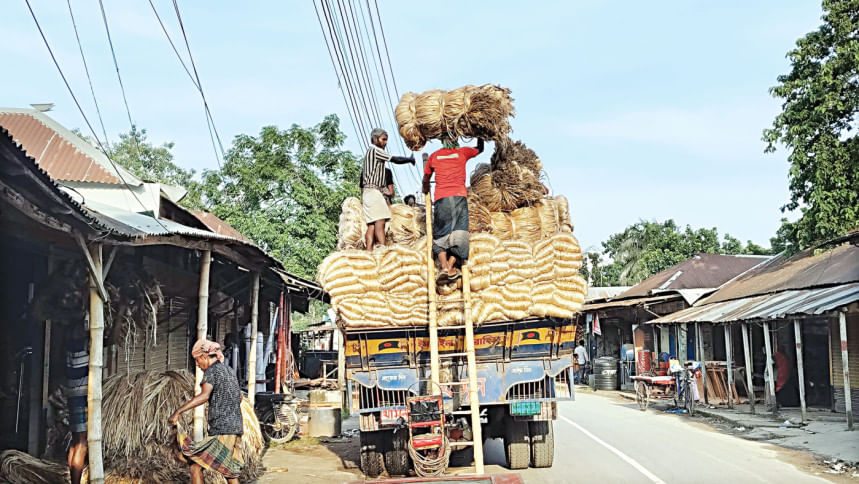Despite good prices, jute farmers in gloom over low yield

Although jute farmers in Faridpur district are getting better prices for their crop this year than a year ago, low yields caused by incessant rain have left many fearing losses in the end.
Jute growers in Faridpur, one of the country's main hubs for the golden fibre, said cultivation costs rose this season due to higher prices of seeds, fertiliser, irrigation and labour.
The price of raw jute has increased by about Tk 800 per maund (1 maund = 40 kg) this time, but farmers fear it may still not be enough to keep them in profit.
Md Sikandar Ali Khan, a jute farmer at Ramkantapur village of Saltha upazila, said yields last year ranged between 12 and 14 maunds per bigha. This year, it has dropped to just 8 to 10 maunds.
"No farmer is benefiting," Khan said, adding that he expects to incur a loss at the end of the season.
The situation is much the same across Faridpur and adjacent districts.
Raw jute now fetches Tk 3,800 to Tk 4,000 per maund, up from Tk 3,000 to Tk 3,200 a year ago. But production has plunged by up to 7 to 8 maunds per bigha
Raw jute now fetches Tk 3,800 to Tk 4,000 per maund, up from Tk 3,000 to Tk 3,200 a year ago. But the price rise hides the reality of falling profitability.
Farmers say production has plunged by up to 7 to 8 maunds per bigha due to waterlogging and early flowering due to heavy rainfall.
At Boalmari upazila, farmer Sukanto Pal said many of his plants died after being submerged.
"Production dropped by 6 to 7 maunds per bigha from up to 14 maunds last year. Due to waterlogging, many plants died, and the quality this time is poor," he said.
Shafiqul Islam, a jute farmer from Faridpur Sadar upazila, has produced 35 maunds this year, well below the 50 maunds he harvested last year. Meanwhile, traders say tight supplies have kept prices high.
"Many old stocks that farmers or traders usually hold are missing this year, which has increased demand," said Akhtaruzzaman Chan, a trader at Kanaipur, one of Faridpur's biggest jute markets.
According to Moktar Molla, president of the Faridpur Jute Farmers Association, cultivating one bigha of jute now costs Tk 40,000 to Tk 42,000. With yields down, those costs rarely turn into profit. After paying for inputs and rising labour charges, many farmers are barely breaking even.
Even income from jute sticks, often a modest source of profit, will not be enough to cover the gap.
Jute farmers receive 1 kg of seeds and 14 kg of fertiliser from the government as incentives. This year, 14,500 jute farmers in Faridpur received such support, according to local officials. Most sell their crop in local markets, from where traders supply mills nationwide.
According to Bangladesh Bureau of Statistics (BBS), jute production fell 6 percent year-on-year to 89.5 lakh bales in fiscal 2024-25, with one bale weighing 180 kg. The drop was due to smaller acreage and lower yields caused by unfavourable weather.
Department of Agricultural Extension (DAE) figures show that jute was grown on 705,000 hectares nationwide this year, with a production target of 83.3 lakh bales.
Faridpur, Rajbari, Sirajganj, Kushtia, Pabna, Manikganj, Tangail, Jamalpur, Rangpur, Kurigram, Gaibandha and Bogura are among the main producing districts.
Md Shahaduzzaman, deputy director of the DAE in Faridpur, said, "Though production is slightly lower, jute cultivation in Faridpur has crossed targets, so the production goal will still be met. We expect the market value of jute produced in Faridpur this year to reach around Tk 2,000 crore, up from Tk 1,600 crore last year."
In Faridpur and neighbouring districts, B-grade jute, which has shorter fibres than top-grade and some discolouration, fetches less. Jute grades range from A to C, based on fibre length, strength, colour and cleanliness.
Md Mahmudun Nabi, a trader from Pabna, said, "In Pabna and nearby districts, jute is selling at Tk 3,500 to Tk 3,700 per maund, whereas last year the price was Tk 2,700 to Tk 2,800 per maund. The jute produced in Pabna and neighbouring areas is B-grade, so prices are lower than Faridpur jute."
Shahadat Hossain, senior market officer of the DAE in Faridpur, said, "Prices per maund have increased by Tk 600 to Tk 800 compared to last year. The lower volume of supply has driven demand and prices up. If supply increases, prices may fall."
Jahangir Hossain Mia, chairman of Karim Group, which has jute mills in the district, said, "There is talk in the market that jute production is down this year, so everyone is eager to buy jute in advance. However, mill owners always want stable jute prices and hope the government sets prices that ensure farmers benefit."

 For all latest news, follow The Daily Star's Google News channel.
For all latest news, follow The Daily Star's Google News channel. 



Comments